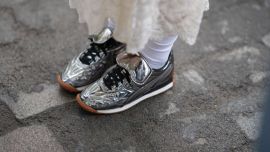Last year’s editorial around this time began by agreeing with the assertion that every day should be International Women’s Day. Tomorrow will still be the only International Women’s Day this year but perhaps it could be argued that every Sunday so far this month will have been a Women’s Day, in Argentina at least. The day itself tomorrow, while last Sunday the acceleration of abortion reform topped all the various issues in the Congress speech of President Alberto Fernández in most headlines (despite surprising nobody, unlike the bill presented in President Mauricio Macri’s 2018 stateof-the-nation speech) – even ahead of the judicial reform to decentralise federal justice (widely suspected of carrying a hidden agenda of scrapping Kirchnerite corruption court cases), which might well turn out to be a bigger bone of contention than the long divisive abortion issue.
Tomorrow will also see two mass marches generally seen as conflicting – one to mark International Women’s Day and the other a Church-backed “prolife” rally – but from another perspective both have their place within the women’s movement if seen as a patchwork quilt rather than one vast green blanket of interwoven headscarves. A quilt with room for more than tomorrow’s two marches: Femicide is worse than ever with one every 23 hours as against every 29 hours as recorded in last March’s editorial, with the post mortem indignities of last weekend’s murder in Catamarca adding a new dimension of horror. The “Me Too” movement here is only a shadow of its Northern Hemisphere counterpart while the gender pay gap (raised in that 2018 Macri state-of-the-nation speech flirting with feminism but strangely neglected ever since) remains an orphan in public debate.
But returning to abortion, there is a need to move beyond the polarisation between Greens and Blues – a need recognised by President Fernández last Sunday in an innovation which perhaps deserved highlighting at least as much as honouring his previous legalisation pledges. His “1,000 days’ plan” to assist those women going ahead with their pregnancies beyond the birth by ensuring adequate nutrition in those vital first three years of life shows a recognition not always present in the “pro-choice” movement – that precisely “choice” is the key word over and above any “one size fits” feminism and that women who choose raising a family also deserve support. The pro-life movement could also learn from this new two-pronged approach because all too often they focus on a dogmatic defence of the rights of unborn life rather than providing constructive alternatives like the “1,000 days’ plan” to address the huge difficulties faced by some girls determined to have their baby against all the odds. In short, this issue is perhaps the clearest example of the patchwork quilt.
Yet for all the dominance of the abortion debate, we should again draw attention to femicide, in purely quantitative terms a much bigger cause of death than backstreet abortions, at least on the basis of the official figures for the latter (43 in 2016 although monstrously higher, according to some extreme feminist groups). Femicide numbers are also worsening with almost a quarter of last year’s 290 in the first two months of this year. Around two-thirds of these murders are what previous generations called “crimes of passion” – there must be zero tolerance for both femicide and less extreme forms of gender violence.
Furthermore, the gender pay gap cannot be overlooked on International Women’s Day as a global injustice, not just cases of extreme misfortune. Women earn 25-30 percent less than men on average but the problem is rather more complex than discrimination by sexist bosses – only around two percent of this gap is due to direct violations of the “same pay for the same work” principle. Alongside discrimination, women face a unique biological injustice with Mother Nature conspiring against her own gender – they have to do all the work in bringing children into the world. Gender equality is an illusion without addressing that basic fact. If less than half of women work an average of 32 hours outside the home as against 70 percent of the male population working an average 42 hours, the real culprit is a grossly unfair division of domestic labour.
Plenty to ponder on International
Women’s Day tomorrow.related news





















Comments